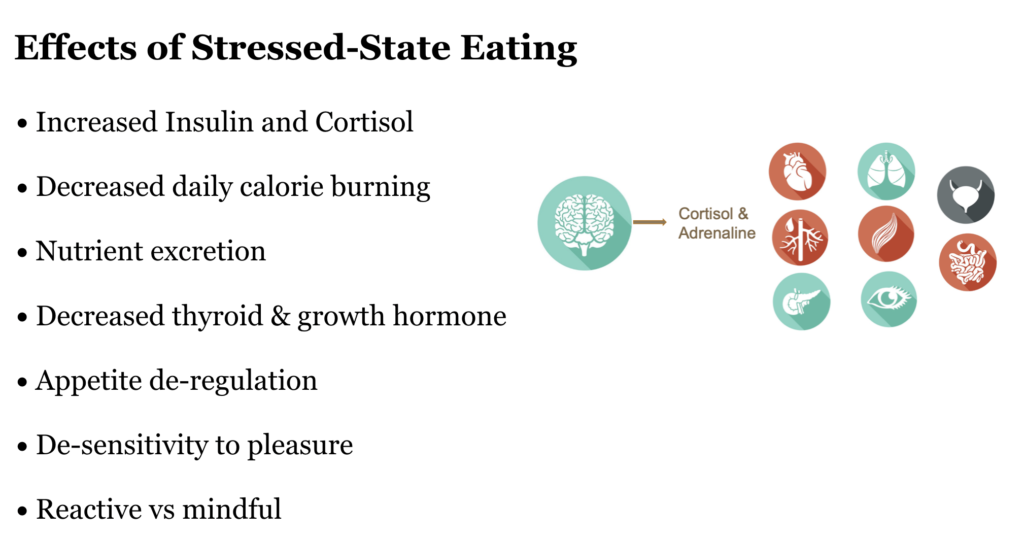What is Emotional Eating?
The relationship between stress and emotional eating are like brother and sister. I don’t have (or have had) one single client who isn’t stressed by the demands of today’s modern world and finds eating as the easiest means to cope. After you’ve coped with food enough times, your brain picks up the message, “Feel bad. Eat Food. Feel Better.” and your autopilot cycles are born.
When you are triggered to eat by an emotion such as stress when you are not truly hungry, we call this emotional eating. In other words, WHY you are eating is due to some external trigger, rather eating due to hunger cues telling you it is time to refuel your body. Although one can practically eat due to any emotion (even happiness!) stress is by far the biggest emotional trigger that most individuals struggle with.
How Does Stress Affect Metabolism?
Stress chemistry is what happens in our mind and body when your brain senses or sees stressors or threats, like a tiger or lion lurking in your backyard, or a work deadline that you may fall short of. It is the psychophysiological shifts that you, me, all of us humans go through that shoots us into a flight, fight, or freeze response. It’s a natural, survival mechanism built into every single human being that happens automatically.
Today’s crazy demanding world creates different kinds of stressors or threats to the body like a lion or tiger once did with our ancestors, yet our brain and body are still wired the same today in terms of how it responds to stress, let’s dive in!
Increased Cortisol
An Increase in cortisol over time tells your body to stop losing weight and stop building muscle. Why? Because your survival brain thinks it has more important things to focus on like a tiger lurking in your backyard! Remember, the brain cannot differentiate between a tiger or a work deadline.
Lower Daily Calorie Burning Capacity
Decreased day in day out calorie burning capacity happens because your survival brain thinks it may need to save your energy for tough times ahead.
Nutrient Excretion
You are eating food but not actually assimilating all the nutrients because the body has more important things to focus on like that supposed tiger than to focus on digesting food in your belly. This means even if you are analytically on point with your calorie intake but you’re constantly stressing over fear of gaining weight, the body will be craving for you to eat more because it’s literally not getting what it needs from what you eat, even though you are eating. This is not a will power problem, it is biology.
Decreased Thyroid Output
Having a decreased thyroid and growth hormone output makes it tough to lose weight don’t you think?!
Lower Appetite
When a tiger is lurking in your backyard, your mind body connection is designed to keep your attention on that tiger a.k.a stressor, and not get distracted by hunger. This way, when the tiger is approaching you’re not like, “ooh a cookie!” and get distracted and put yourself in danger. Why is a lower appetite a bad thing, wouldn’t that be beneficial when you are trying to lose weight? Well, what tends to happen however in today’s world however, is when you do get to finally relax aka at the end of a stressful day after around work or food, your brain snaps out of survival mode, and your mind and body start chit chatting and realize, ‘holy crap we need to eat…WHERE’S THE FOOD?!!!’ Hello overeating, hello bingeing.
De-sensitivity to Pleasure From Food
This means you need to eat MORE food for your brain to feel satisfied. ALL HUMANS are designed to find pleasure in food-why? So we eat and survive as a species! When you don’t have enough pleasure at a meal, your brain struggles to register all that you consumed, and biology will signal you to eat more food regardless of how many analytical calories you have accounted for that day. Again, do you see this is NOT a will power problem?
Adverse Impact On the Executive Decision Making Portion of Your Brain
When you are in stress chemistry, you are in a survival state. You react. Automatic, subconscious habits take over. It is really difficult to bring mindfulness into the picture. It is really hard to stop and think, “hmm, do I really want to eat that piece of cake? How will that make me feel?”
Binge Eating
When your brain sees those real or self imposed stressors, when it sees the tiger, the body can enter a fight, flight, freeze OR FEED response. When the body is overly stressed by something being tightly controlled like your diet, like your work schedule, like your obsessive thoughts about food….the body can enter a FEED response to alleviate this built up stress and balance it out. If you struggle with binge eating, check out my How Do I Stop Binge Eating At Night article.

How Can I Relieve Stress Without Overeating?
When you’re experiencing stress, your impulse might be to power through, freak out, stick your head in the sand, or continue with the same unwanted habits that are not really serving you because that’s your default right now. Behaviors such as busyness, overworking, overeating, drinking alcohol to excess, isolation, or taking your frustration out on others are actions that simply perpetuate the stress chain reaction. It’s really not removing the underlying stressors.
Next time you feel stressed and have the urge to eat, apply our F.E.A.S.T Strategy: Focus, Explore, Accept, Strategize, Take Action
FOCUS
Focus your attention inward. Pause. Move away from food. Close your eyes if possible. Take a few deep breaths to put a pause between stimulus and response. Focus on the present moment.
EXPLORE
Do a slow head to toe scan. Become aware of what you’re thinking, feeling, how your body is reacting, and what you’re doing as a result…without judging it. Just observe what is there. As you explore your feelings, you may notice boredom, loneliness, anger, frustration, happiness, and a myriad of other emotions. Emotions provide information so practice noticing what you’re feeling. I highly suggest you also explore any self -attacking THOUGHTS. Until you pause to become aware of your thoughts, you may not be aware that they are a sneaky source of your stress.
ACCEPT
It is what it is, and what you resist persists! Denying your feelings, avoiding difficult situations, pushing things away, or stuffing them down with food works like a spring: it takes a lot of energy to hold it down and it will pop back up, often when you least expect it. Instead, accept things as they are without judgment. Admittedly, this is not always easy but it is very effective.
Respect your personal limitations. Let’s face it, our society places a lot of demands on our energy and time. This often creates unrealistic expectations (sometimes coming from within) and a sense of urgency, leading to stress. It’s important to respect your own personal strengths and limitations and use self-compassion when you are experiencing stress: “I’m feeling overwhelmed and tense. I can’t do everything on my to do list; no one could, but I’m doing my best-and that will have to be good enough for now.” Or “I can choose to either resist this or allow this. Resisting this situation is futile and is increasing my stress.”
When you accept the situation (and yourself) as it is in this moment, and just allow it to be, you won’t compound the stress response by overreacting to it.
STRATEGIZE
What could you do to manage stress more effectively than eating? Put things in perspective: When you’re feeling overwhelmed, stop and ask yourself two questions:
“What difference will this make one week or even one year from now?”
“Is this really important to me?” If the situation will have no long-term consequences and does not hold true importance in your life, it deserves less of your energy. If you are in an “over-reactive mode,” go back to the Focus step.
TAKE CHARGE
If you notice that you’re feeling out of control (a common source of stress), ask yourself, “Can I change this? If so, how?” Take a baby step in the direction you want to go. Here is great go-to list of 175 Things To Do Besides Emotionally Eat to help you on your way!

Do you see how walking around day to day in chronic low, medium, or high stress chemistry impacts your metabolism and eating behaviors? The good news is, it is not all happening because you’re not disciplined or do not have willpower. It’s just biology! Taking proactive steps to manage your stress will without a doubt have a positive impact on how you do food as well! What small step will you take to help you manage stress?
Enjoy this article? Join the movement to change the conversation around food and diet culture by sharing this post!


